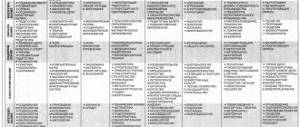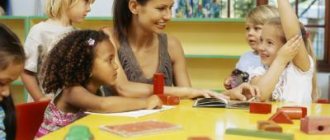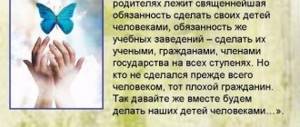Parent meeting “Peculiarities of adolescence”
Parent meeting
"Features of adolescence"
Goal: to expand parents’ knowledge about the age-related characteristics of adolescence, to help parents overcome difficulties in communicating with teenage children.
PROGRESS OF THE MEETING
Dear parents, today I would like to talk to you about what adolescence is, what problems can arise during this period, and together we will try to find a way out of difficult situations. How to learn to understand and accept a teenager?
What is adolescence, what problems can arise and how to find a way out of various difficult situations? Every parent asks himself these questions sooner or later when his child enters puberty. The period of a child’s puberty is inevitable and parents should be prepared to experience it calmly and together with their child, and not on opposite sides of the barricades. Children experience this period differently: some rebel, openly protest, others suffer in silence, withdrawing into themselves and quietly swallowing tears. However, in both cases, children need support, attention and care. They should really feel that their family and friends understand their problems and are trying to answer the questions that the very situation of growing up poses to them.
And I suggest you start with the game “ Associations”
" Select associations for the word teenager, adolescence.
P - action, problem, understanding, behavior
O - optimism, sadness, approval
D - friendship, kindness, trust, dialogue
R - joy, decision, parents, child, conversation
O - communication
S - quarrel, independence, secret, severity, doubt
T - requirement, difficulty, patience, tolerance, creativity
O - environment, education
K - collective, conflict, whim
Thank you, dear parents.
Scientists are convinced that the “correct” age, when a child obeys adults in everything, lasts until 10-11 years. At 7-10 years old, a little person imitates his older mentors in everything. It is a completely different matter for an older teenager who has entered the period from 13 to 15 years.
Adolescence is a special and very important age for the further development of personality. At this time, a significant restructuring of the teenager’s entire body occurs. This is a period of rapid and at the same time uneven physical development: the body grows rapidly and its proportions change, the muscular apparatus improves. This also causes some psychological manifestations - the teenager realizes and experiences his angularity and awkwardness.
In adolescence, there is a discrepancy in the development of the cardiovascular system, which results in dizziness, palpitations, headaches, weakness, fatigue, etc. observed in some adolescents.
Lecture + presentation “Age characteristics of adolescents.” 8-9 grades
Target:
to acquaint parents with the characteristics of adolescence, to outline ways of possible solutions to problems and conflicts during this period of development.
Form of conduct
– lecture.
Here they are, these main truths:
Late noticed, late taken into account...
No, children are not born difficult
They just didn't get help in time.
Adolescence is an important and difficult stage in a person’s life, a time of choice that largely determines the rest of one’s life. It can be compared to Ivan Tsarevich stopping at a fork in the road near a stone on which it is written: “You will go left..., you will go right...”. In ancient times, this stage was considered the same qualitative change in state as birth, marriage, and death. What are the main changes that a modern teenager feels in himself? Slide 1.
Adolescence is marked by rapid development and restructuring of the child’s social activity. Powerful changes occur in all areas of a child’s life; it is no coincidence that this age is called “transitional” from childhood to adulthood.
Adolescence is considered as a stage of personality development, a process of transition from a dependent, supervised childhood, when a child lives according to special rules established for him by adults to an independent life. Slide 2.
At this time, stable forms of behavior, character traits and methods of emotional response take shape, which in the future largely determine the life of an adult, his physical and mental health. That is why the role of the family environment is so great in providing conditions that do not hinder, but, on the contrary, promote the healthy development of the adolescent’s personality. Slide 3.
Observations of children in various situations reveal the dependence of the manifestations of the type of temperament on the motives and needs that motivate them to activity: when performing meaningful, interesting work, a child can be very active and becomes slow when involved in uninteresting activities. There are the following types of accentuations: cycloid, hyperactive, astheno-neurotic, sensitive, psychoasthenic, demonstrative, unstable, conformal. Slide 4.
At the age of 13-14 years, the system of values and interests changes. What was valuable is devalued, new idols appear, the nature of relationships with adults and parents is often of a protest nature. At this age, teenagers are drawn to everything unusual and often get carried away by informal trends. The modern teenager has a pronounced desire for individualization, to assert his “I”. Slide 5.
Outwardly, the age crisis manifests itself in rudeness, secrecy, deliberate behavior, the desire to act contrary to the demands and wishes of adults; in ignoring comments, withdrawing from the usual sphere of communication. The difficulty is that the teenager does not know how to analyze the reasons for what is happening to him. Slide 6.
A teenager often has an unreasonable feeling of anxiety, self-esteem fluctuates, at this time he is very vulnerable, conflicted, and can become depressed. He must be in his eyes very smart, very handsome, very brave, very capable, etc. Slide 7.
At the same time, restructuring a teenager’s attitude towards himself affects not only his emotional state, but also the development of his creative abilities and satisfaction with life in general. Studying takes a back seat at this time.
Slide 8.
The most important issue of adolescence is puberty. At this time, psychosexual attitudes and orientations are formed. A teenager experiences first love, he has erotic fantasies and experiences. It changes so much that this period is called a “hormonal storm or endocrine storm.” What is needed is the tact and patience of adults, their recognition of the personal life of a son or daughter as an independently existing sphere. Then trust arises (or is maintained), the desire to talk about difficulties, share joy, get advice from loved ones, and not from friends on the street. Slide 9.
Rapid, uneven growth begins, as a result of which the teenager becomes disproportionate and clumsy. The child’s body undergoes profound restructuring, and at a very fast pace. Rapid physical development is accompanied by a number of contradictory issues. Often there is a rejection of their body and appearance, then they exhaust themselves with diets, exercise, simply suffer and withdraw into themselves. Such phenomena should not cause much concern for parents, but it is necessary to know them and take them into account when organizing the life of a teenager. Slide 10.
Since a teenager strives for extreme positions in assessment, he tends to overestimate or underestimate his qualities and properties. Teenagers are critical of the negative traits of their character, worrying about those traits that interfere with their friendships and relationships with other people. Slide 11.
A teenager's self-esteem is unstable: he is inclined to consider himself either a genius or a nonentity. Any little thing can radically change a teenager’s attitude towards himself. If he is forced to admit that something is wrong, his opinion of himself drops on all counts, however, such contradictory self-esteem is necessary in order for him to develop new, adult criteria for personal development. Slide 12.
The self-esteem of adolescents is contradictory and insufficiently holistic, so many unmotivated actions may arise in their behavior. Teenagers, more than other age groups, suffer from the instability of the social, economic and moral situation in the country, having today lost the necessary orientation in values and ideals - the old ones have been destroyed, new ones have not yet been created.
Slide 13.
Features are manifested in a disdainful attitude towards learning, poor academic performance, bravado, failure to fulfill responsibilities: avoiding performing any duties and errands around the house, preparing homework, or even attending classes. Adults sometimes do not notice or do not understand such uneven behavior; they are equally discouraged by exorbitant excitement and inexplicable fatigue. Slide 14.
Such teenagers find themselves faced with a large amount of “extra time,” but they are characterized by an inability to spend their leisure time meaningfully. The majority have no hobbies, they do not participate in sections and clubs, and do not attend exhibitions and theaters. Unfortunately, in their free time, antisocial behavior of adolescents is predominantly manifested (prostitution, drug addiction, substance abuse, etc.) Slide 15.
Wasting time without meaning pushes teenagers to search for new “thrills.” Alcoholism and drug addiction are closely intertwined with the structure of the deviant lifestyle of adolescents. Very often teenagers talk about: successful adventures, hooliganism, fights, petty thefts and drinking alcohol. It turns out that one of the available types of entertainment for teenagers is fighting. Thus, almost a third (29%) of teenagers admit that they fight because there is nothing to do, nowhere to put their energy, and life is boring. Slide 16.
Subsequently, when explaining their actions, teenagers have a misconception about morality, justice, courage and bravery. The least number of teenagers (15%) are studying history, mathematics and art, and amateur film and photography. Slide 17.
Throughout adolescence, there is a clearly defined dynamics of aggressiveness. Forms of aggressive behavior are typical for most adolescents. 27% of teenagers do not deny their participation in the beating of dissidents, that is, those who have other interests. Slide 18.
One of the elements of the microenvironment in the relationships that shape personality is the family. At the same time, what is decisive is not its composition - complete, incomplete, disintegrated, but the moral atmosphere, the relationships that develop between adult family members, between adults and children. In joint activities, not only parents discover the character of their son or daughter, but also children get to know their parents better. A teenager needs joint activities with adults. Slide 19.
Unfortunately, in our time, the number of dysfunctional families in which there is complete neglect, lack of control of behavior on the part of parents, indifference to the fate of the teenager, is growing, which is where children with behavioral problems appear. Slide 20.
But even in seemingly prosperous families, many problems of a psychological nature can be identified that lead to a crisis of adolescence. Only 15% of parents wrote that they know everything about their child. Only 6% of parents encourage their children to study in clubs, sections, and clubs; 3% introduce their children, in their opinion, to interesting guys.
Slide 21.
We can distinguish 4 dysfunctional situations in the family: Hyperprotection of various degrees: from the desire to be an accomplice in all manifestations of the internal life of children to family tyranny. Hypoprotection often turns into neglect. The situation that creates a “family idol” is constant attention to any impulse of the child and excessive praise for very modest successes. A situation that creates “Cinderellas” in the family. There are many families where parents pay a lot of attention to themselves and little to their children. Slide 22.
Ways to solve the problem.
Forming a teenager’s circle of interests based on his character traits and abilities. Maximum reduction of the period of his free time - “time of idle existence and idleness.” Involving a teenager in activities that lie in the sphere of interests of adults, but at the same time creates opportunities for him to realize and establish himself at the adult level. Slide 23.
Reducing the manifestation of aggression by attending sports schools, daily gymnastics at home using dumbbells, iron weights and boxing gloves (let teenagers beat each other in a peaceful fight, giving an outlet to the accumulated energy, so that aggression does not accumulate like static electricity, which tends to explode in painful discharges). Physical education can become a common and joyful activity for every family member. Slide 24.
Do not make excessive demands on the teenager that are not confirmed by his abilities. Honestly point out his successes and failures (attribute successes to his abilities, and failures to insufficient preparation). Do not praise a teenager, explaining his failures as an accident, because this creates the effect of inadequacy in the teenager. Passion for art, joint visits to cinema and theater, discussion of literary novelties, assistance in construction - this is not a complete list of those areas in which an adult can be together with a teenager. Slide 25.
Recommendations for parents.
Always be sensitive to the affairs of your children. Analyze with your children the reasons for their successes and failures. Support your child when things are difficult for him. Try not to protect your teenager from difficulties. Teach you to overcome difficulties. Constantly monitor the child, but without overprotection. Encourage even the barely emerging needs for knowledge, harmony and beauty, and self-actualization. Tell your child about your problems, about what worried you when you were their age. Buy your child books on psychology and self-knowledge. Always lead by example (teach with actions, not words).
Slide 26.
Talk to children as equals, respecting their opinions, avoiding moralizing, shouting, edification, and even more so irony. Advise you to take care of your appearance. Do not under any circumstances prohibit relationships with the opposite sex, do not stop conversations about the relationship between boys and girls. Get to know your child's friends, ask them to inform you about ways to spend time, but don't turn into a spy. Remember: mistrust is offensive! Keep track of what books your child reads and what films he watches. Always be for your child, first of all, an older, wise friend and only then a loving mother (father)! Slide 27.
Questionnaire “Are you a good parent??»
The questions in this test must be answered “yes”, “no”, “I don’t know”.
So: 1. You often react to some of your child’s actions with an “explosion” and then regret it. 2. Sometimes you take help or advice from friends when you don't know how to respond to your child's behavior. 3. Your intuition and experience are the best advisers in raising a child. 4. Sometimes you happen to trust your child with a secret that you would not tell anyone else. 5. You are offended by other people's negative opinions about your child. 6. You happen to ask your child for forgiveness for your behavior. 7. You think that a child should not have secrets from his parents. 8. You notice differences between your character and the character of your child that sometimes surprise you. Slide 28.
9. You worry too much about your child’s troubles or failures. 10. You can resist buying something that interests your child (even if you have money) because you know that the house is full of them. 11. You think that up to a certain age, the best educational argument for a child is physical punishment (belt). 12. Your child is exactly what you dreamed of. 13. Your child gives you more trouble than joy. 14. Sometimes you feel like your child is teaching you new thoughts and behaviors. 15. You have conflicts with your own child. Slide 29.
Calculation of results.
For each answer “yes” to questions: 2,4,6,8,10,12,14, as well as “no” to questions: 1,3,5,7,9,11,13,15, you get 10 points . For every “I don’t know” you get 5 points. Count up your points.
100-150 points.
You have great opportunities to understand your own child correctly.
Your views and judgments are your allies in solving various educational problems. If this is accompanied by such open and tolerant behavior in practice, you can be recognized as an example worthy of emulation. For the ideal you need one small step. This could be your child's opinion. Slide 30.
50-99 points
. You are on the right road to better understanding your own child. You can resolve your temporary difficulties or problems with your child by starting with yourself. And don’t try to make excuses about lack of time or your child’s nature. There are several issues that you have influence over, so try to use it. And don’t forget that understanding does not always mean accepting. Not only the child, but also your own personality too.
0-49 points
.
It seems that one can only sympathize more with your child than with you, since he did not end up with a parent - a good friend and guide on the difficult road of gaining life experience. But all is not lost. If you really want to do something for your child, try something different. Maybe you can find someone who can help you with this. It will not be easy, but in the future it will return with gratitude and the established life of your child. Slide 31. Full text of the material Lecture + presentation “Age characteristics of adolescents.”
8-9 grades see the downloadable file . The page contains a fragment.
| Author: Mikeladze Irina Petrovna → IrinaMik 09.10.2010 22 35630 9902 | Comment |
Thank you for your mark. If you want your name to be known to the author, log in to the site as a user and click Thank you again. Your name will appear on this page.
Login | Registration
Have an opinion? Leave a comment



